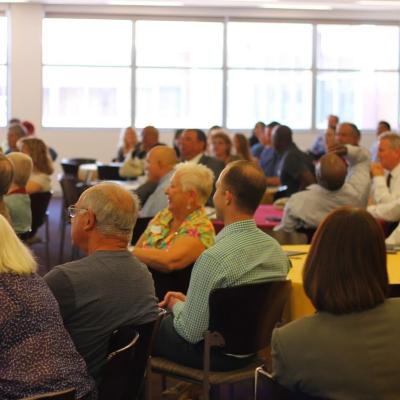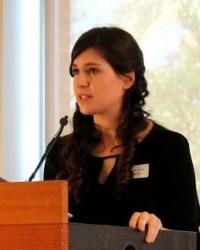Meet the Prison Education Awareness Club (PEAC)
The Prison Education Awareness Club (PEAC, pronounced "peace") started at Arizona State University four years ago. The club began as an off shoot of The Pen Project, a Department of English writing internship that remotely (and anonymously) pairs ASU interns with inmates in maximum-security prisons in Arizona and New Mexico. The interns coach inmates wanting to improve their writing skills using poetry, prose, lyrics, and essays.
In collaboration with The Pen Project, PEAC advocates for and informs the ASU community about issues relating to prison education. It seeks to shed light on the need for more comprehensive educational opportunities for those currently in our prison population, as well as to acknowledge the work done in prison education throughout the United States.
Established as a grassroots, outreach club, PEAC works to spread knowledge about the need for more education and job training for the maximum security inmate population by sponsoring the annual ASU Prison Education Conference each March. The premise of this program is that education reduces recidivism. The more educational opportunities inmates have while incarcerated, the less likely they are to return to prison once released.
The conference is completely arranged by the PEAC officers who are all students at ASU. The most recent conference featured keynotes by Kyes Stevens of Alabama Prison Arts and Education Project, and teaching artist and author Judith Tannenbaum, who worked for several years teaching in prisons in California. It also featured several local panels of employees and educators from the Arizona Department of Corrections, a group of educators from Rio Salado College—which offers college correspondence courses to inmates all over the U.S.—and a panel of ASU volunteers including educators, students, and current Pen Project interns.
The Club meets on the third Thursday of each month during the academic year. A typical meeting includes a chance to network with others interested in prison reform and education, as well as the opportunity to hear a guest speaker share experiences from the prison education field. It is the general consensus that attending a PEAC meeting is an eye-opening experience for most students. When they hear the stories from the guest speakers—outlining the brutality and hopeless conditions in our prison system—they are changed.
If you are interested in knowing more about The Pen Project or PEAC, contact its director/faculty advisor, Cornelia Wells. Students with strong writing and editing skills, a solid GPA, and an interest in prison education are encouraged to apply for the Pen Project internship. You must be of sophomore standing and have passed English 102 to be considered. PEAC is open to any interested student at ASU.
Q&A with PEAC President, Jess Fletcher
Jessica “Jess” Fletcher is a double major in Creative Writing and Psychology, with a minor in Family and Human Development. She will continue in her role as President of PEAC for the 2015-2016 academic year.
I recently sat down with her and asked a few questions about her work with the club.
►What initially got you interested in prison education?
FLETCHER: I initially got interested when my Honors English 102 professor, Dr. Cornelia 'Corri' Wells, asked me to participate in the Pen Project ENG 484 internship. I had never been exposed to this topic, prison education, until I took the course. I am so glad that I did. After reading the memoirs she assigned (A Place to Stand by Jimmy Santiago Baca, and others), I got ‘prison fever’ and began taking a more active role in the Prison Education Awareness Club (PEAC) on campus. Since then, I have become even more passionate about this cause.
►What has been the best thing about advocating for reform in prison education?
FLETCHER: The best thing is the unfailing gratitude of the inmates who benefit from these programs. After interning, I was given the opportunity to assist with a creative writing workshop at the Browning Unit in the Eyman complex at the State Prison in Florence. The students were enthusiastic. They participated in each exercise, and they were hungry to learn more. Additionally, I have been able to see firsthand the persevering hard work of men who have since left the prison and continued their education. This makes advocating truly a passion.
►What is your vision for PEAC in the next year? How can it become more visible at ASU and beyond?
FLETCHER: I envision PEAC taking a more active role in prison education reform and awareness this upcoming year. Our successes with the Prison Education Conferences have increased awareness and also changed our focus. Now, we are gearing more towards organization and implementation of programs in Arizona. We would also like to see the club expand in other areas such as juvenile education and prevention activities. We’d love to assist with reintegration courses for inmates after their release. Per our mission statement, we will continue reducing the stigma around prison education.
Photo 1: The 2015 Prison Education Conference was full to capacity at most sessions. Photo/Michelle McKay
Photo 2: Jessica "Jess" Fletcher speaks at the 2015 Prison Education Conference. Photo/Michelle McKay
Header background image is an undated photograph—likely from the early 1900s—of members of the Alpha Society, a mandatory literary club, posing with what is now "A" Mountain in the background. UP UPC ASUD A4242 #3


